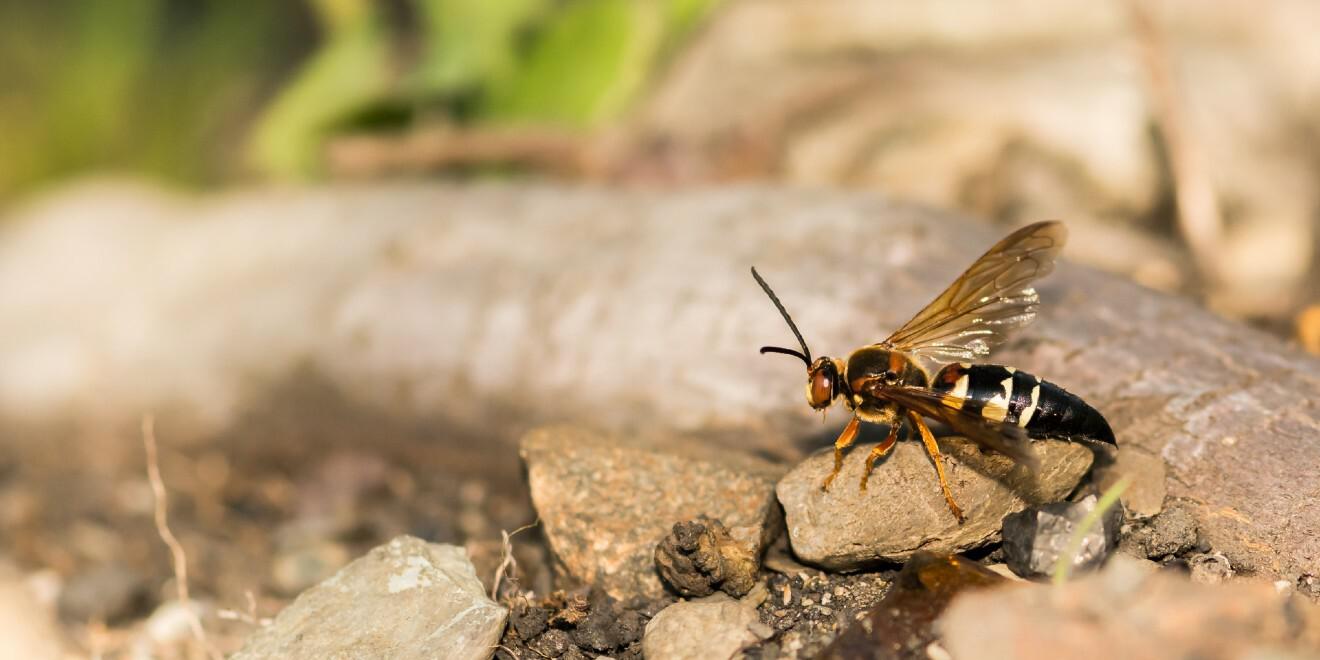Let Us Introduce You to the Ominous Cicada Killer Wasp
Posted by Mosquito Squad
July 1, 2024

While your first instinct upon seeing a giant wasp is likely to run or swat it away, the cicada killer wasp may be more friend than foe. These wasps are known for their large size and unique behavior of paralyzing and carrying cicadas to feed to their larvae. The name cicada killer sounds scary, but they help manage cicada populations and are less harmful than you might expect.
Get to know the cicada killer wasps and how they control cicadas.
What Is a Cicada Killer?
Cicada killers, also known as ground-digger wasps, are large solitary wasps. Each cicada killer female forms her own nest by digging a hole in dry and sandy ground. After mating, the female searches for cicadas, which she stings and paralyzes before transporting them back to the nest. The female wasp deposits the cicada in a specially constructed chamber within her burrow. Then she lays a single egg on the paralyzed cicada before sealing the chamber and repeating the process. The developing wasp larva feeds on the cicada until it pupates and emerges as an adult the following year.
Related Blog: What Is the Difference Between Bees, Wasps, and Hornets?
What Does a Cicada Killer Look Like?
The cicada killer’s size is one of its most notable features. The average cicada killer size ranges from 1.5 to 2 inches! Like many other wasps, they have black and yellow coloration on their body. However, their distinct, amber-colored wings and large red eyes set them apart.
Are Cicada Killer Wasps Dangerous?
Despite their alarming size, cicada killer wasps are not typically considered dangerous to humans. As solitary wasps, they are focused on finding mates and supplying their nests rather than defending a large colony. These ground digger wasps build their nests in sandy soil and prefer more natural and less densely populated areas. This limits the chances of encountering them around your home.
However, some people may be allergic to the wasps’ venom and could experience severe reactions. If you have an allergy to wasps, it's important to take precautions to deter cicada killers. Female cicada killer wasps can sting, but they rarely sting humans unless they perceive a direct threat. The primary purpose of a female cicada killer’s stinger is to subdue cicadas for their larvae.
Male cicada killers have been known to dive-bomb intruders and hover in front of faces to protect their nests. Luckily, these threats don’t cause any real harm, as males cannot sting.
Related Blog: Don’t Fret: The Murder Hornet Isn’t Fit to Star in a Crime Podcast
How to Get Rid of Cicada Killer Wasps and Keep Them Away
If you live in an area where cicadas are present, cicada killers are also likely nearby. Here’s what you can do to prevent and mitigate their presence.
Tips to Prevent Cicada Killers
Cicada killers prefer to nest in bare, dry, sandy soil, so you can make your yard less burrow-friendly by covering exposed soil with mulch or vegetation. Additionally, keep your lawn well-watered, as cicada killers don’t like moist ground.
Tips to Get Rid of Cicada Killers
If you already have a nest in your yard, the nest will need to be manually removed or disrupted to kill wasps in the nest and deter others in the future. One common method to kill wasps in an existing nest is to pour boiling water into the hole and cover the opening with a glass. However, using a DIY method to get rid of cicada killers can put you at risk of a sting. In cases where cicada killer wasp populations are particularly problematic or pose a threat to individuals with allergies, professional assistance is recommended. Connect with your local Mosquito Squad for reliable wasp control service; we will remove existing nests and spray all areas where cicada killers are likely to burrow.
Stay Proactive and Protect Your Yard from Wasps
While cicada killers don’t pose a significant threat to people without an allergy, no one wants wasps buzzing around their yard. To safely prevent, manage, and remove cicada killers from your space, trust the pros at Mosquito Squad!
Request a quote online or call our team at (877) 332-2239 to get started.
